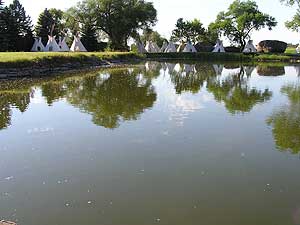|
Audio
Photos
Resources
|
July 22, 2005
 |
| The "Song of Hiawatha" is performed on a natural stage surrounding this small lake near Pipestone. (MPR Photo/Mark Steil) |
Pipestone, Minn. — The Longfellow poem is a 200-page plus epic of Indian legends and human failing, bound together by a love story.
The Pipestone performance is a condensed version of Longfellow's work. It includes many names familiar to the region -- Hiawatha, Nokomis, Wenonah, Osseo, Minnehaha and Pipe-stone. The play is staged outdoors about a half mile from the famous Pipestone quarries, worked by Indians from across the U.S. They use the stone mainly to make traditional pipes.
Longfellow's book mentions a "great Red Pipe-stone quarry." Residents here believe Longfellow had this location in mind.
"Sometimes this gets to be a lot of work, but yet it's kind of rewarding in the end," says Gary Olsen, the play's director.
Olsen looks over the lip of what may be the largest stage in the nation. It's more than a quarter mile long. It runs along a small lake, and up a cliff overlooking the water.
The audience watches the action from a chair-covered hill on the lake's opposite side. Olsen says they see a theater performance staged by scores of volunteers.
"We have people that are in phone service that are members here. We have people that are electricians that are here. I think we have a banker here. We have a certified public accountant here. We have plumbers here. We have every kind of member you can think of here," says Olsen.
Olsen says all that expertise pays off when opening night arrives, and the audience hears this narration.
"By the shores of Gitche Gumee,
By the shining Big-Sea-Water,
Stood the wigwam of Nokomis,
Daughter of the Moon, Nokomis."
In a 1982 edition of Longfellow's classic, Douglas DeShield says the book got mixed reviews when it was first published in 1855. One critic said Longfellow was mistaken to base his epic poem on "silly" Indian legends. But it sold well, as one of the first sympathetic portrayals of Indians in literature.
On the outdoor stage in Pipestone, the town's theatrical version is attended by thousands each year. Indians have acted major roles in the production, though usually white actors fill most of the slots.
There's only been one major negative review. In the 1970s, American Indian Movement members noisily interrupted a performance, demonstrating for more than half an hour.
Native American Bud Johnston works in Pipestone. He's a member of the Bad River Band in Wisconsin. Johnston says some Indians criticize the play, but he says overall it's a plus for Native culture.
"Anything, like the pageant, that shows a little bit of our tribal culture, even if it is a romanticized version of it, is a good thing," says Johnston. "Because the public needs to know that our tribal people in North America had a vibrant, living culture for thousands and thousands of years before the Europeans got here."
The performance of Longfellow's poem has a long tradition in southwest Minnesota. It was first staged in the 1930s by students at the federal Pipestone Indian School. The current production started in 1949.
Wanita Beal has worked on the pageant for 57 years. She says it's too bad most people don't know anything about Longfellow or his famous poem. She remembers a young man who approached her a few years ago just before the play began, and asked her, "What's going on?"
"I said, 'Well, it's the pageant.' 'What's that?' he asked. 'Well, it's the Song of Hiawatha, written by Longfellow. Did you study that in school?' 'Nope, never heard of it,' the boy responded. 'Well, who is this dude, Hiawatha?'"
It's a question Beal hopes that young man, and others, get answered at the Pipestone pageant.
Attendance has declined in recent years, as more people entertain at home or patronize other outlets, like casinos. Despite the competition, the Pipestone pageant will continue. It's become a work of both community and literary pride.






